In Plain Sight: Part II
March 18, 2021
After attending a handful of group “Bible talks” in the Evans Hall basement in 2015 during her first year as a student at the neighboring Emmanuel College, Danielle Agrella said that one of the Simmons students who originally invited her wanted to meet with her for an individual Bible study.
Because she was new, they were to meet weekly to go over the ‘foundations’ of the Bible, despite Agrella attending three different youth groups at three different churches in middle and high school.
This smaller group followed the same formation and series of lessons which originated in the early days of the International Churches of Christ. Once an initial connection with a potential convert is made, they are encouraged to attend group “Bible talks” and to start an individual Bible study.
The individual studies are referred to as “discipling,” held without disclosing that the goal of the person leading the study, the “discipler,” is to get them baptized into membership of the International Churches of Christ as soon as possible.
Another member of the Church’s campus ministry, typically a newer member of the Church, sits-in and takes notes for the potential convert who is still unaware that they are a potential convert.
The discipler follows the steps written out in what essentially is a study guide, sometimes referred to as “Making Disciples” or “First Principles,” teaching that the entirety of the Bible is absolute truth and is to be taken literally.
To be a real Christian, a disciple, is to be baptized. Potential converts don’t find out until later, however, that the only way for a baptism to be valid is if it is a baptism into the International Church of Christ.
International Church of Christ Congregations across the nation “all use some variant of First Principles/Making Disciples,” that have had little change since their inception in 1967 according to Chris Lee, the Executive Director of REVEAL.
An organization of former members of the International Churches of Christ, REVEAL’s website says its purpose is “to provide accurate, detailed and complete information about its (the Churches) beliefs and practices.”
In addition to the discipling meetings and Bible talks, the Church encourages potential members to spend increasing amounts of time with the Church by attending multiple services each week, game nights, retreats, and other social events.
Seeing years of destruction and repetitive patterns of students involved with the Church being isolated from friends, sharp declines in academic performance, and loss of interest in curriculars outside of the Boston Church of Christ, the late Rev. Robert Watts Thornburg, Dean of Boston University’s Marsh Chapel, published his observations in 1988, warning students, parents and neighboring institutions of the church’s practices.
Thornburg’s policies and guidelines for Boston University (BU) were adopted by schools throughout Boston, with administrators at Harvard and Northeastern explicitly advising students to be wary of the International Churches of Christ.
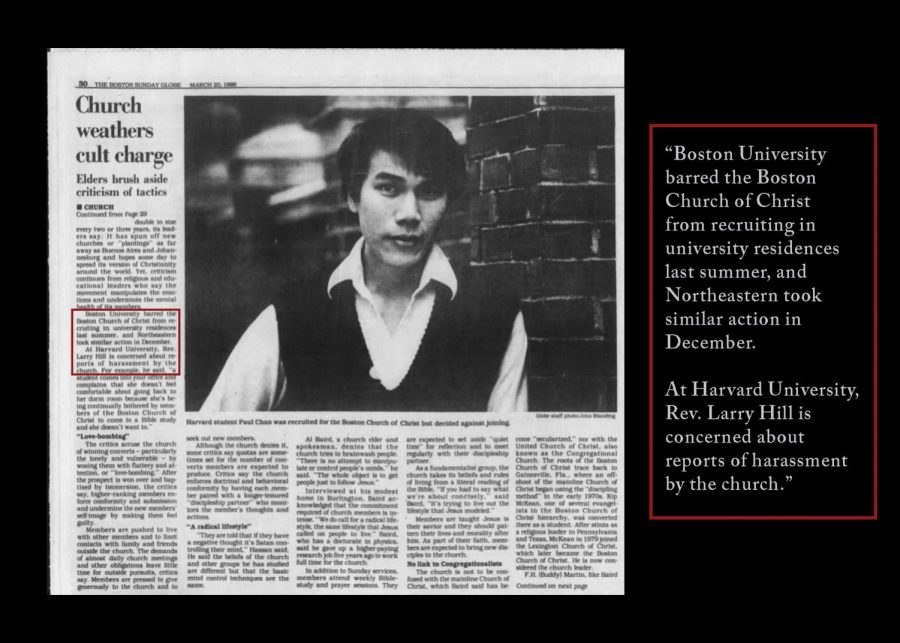
“Boston University barred the Boston Church of Christ from recruiting in university residences last summer, and Northeastern took similar action in December.
At Harvard University, Rev. Larry Hill is concerned about reports of harassment by the church.”
Simmons’ Spiritual Life Code of Conduct prohibits proselytizing and behaviors and explicitly states that all groups wishing to meet on campus are required to go through the student organization approval process.
Former members of the Church and experts on destructive faith groups claim that nearly all of the potential member’s free time is spent with those associated with the Church. The time commitment sometimes removes them from prior friendships, extracurriculars, academics, and even their families.
One of “the most damaging things and hurtful things” about the behaviors of the International Churches of Christ is how they say “your family is not your family,” said an administrator at a higher-education institution in Eastern Massachusetts about the Church’s presence on college campuses. The Voice granted the administrator anonymity, as they were fearful about possible repercussions for speaking to the press.
According to the source, messages and actions of the Church attempt to convey that they are the members’ new family. “They start isolating you from your family and your friend group. You know, love-bombing you, reaching out, not taking no for an answer.”

As the discipling studies and potential member’s level of involvement progress, the Boston Church of Christ’s version of First Principles covers the topic of persecution in the ‘Discipleship: Light & Darkness III’ study, saying that one “can’t be a disciple and never be persecuted.”
At some point throughout the series of studies, the discipler and the note taker disclose which church they are a part of. In Agrella’s case, it took nearly two months of attending the Bible talks in Evans Hall and her individual studies for the students who invited her to disclose that they were affiliated with the Boston Church of Christ. The description they gave to her prior to that point was a “non-denominational evangelical church group.”
Agrella’s discipler told her about how during the 80s their church had faced persecution because its leader “converted so many people and he had such a good following that there were a lot of people that felt that he was making a cult out of our religion pretty much in this… sector of Christianity. This Church.”
As the Church has garnered years of controversy and warnings surrounding its behaviors, any criticism or questioning of behaviors gets pinned as persecution in order to be put into a Biblical context.
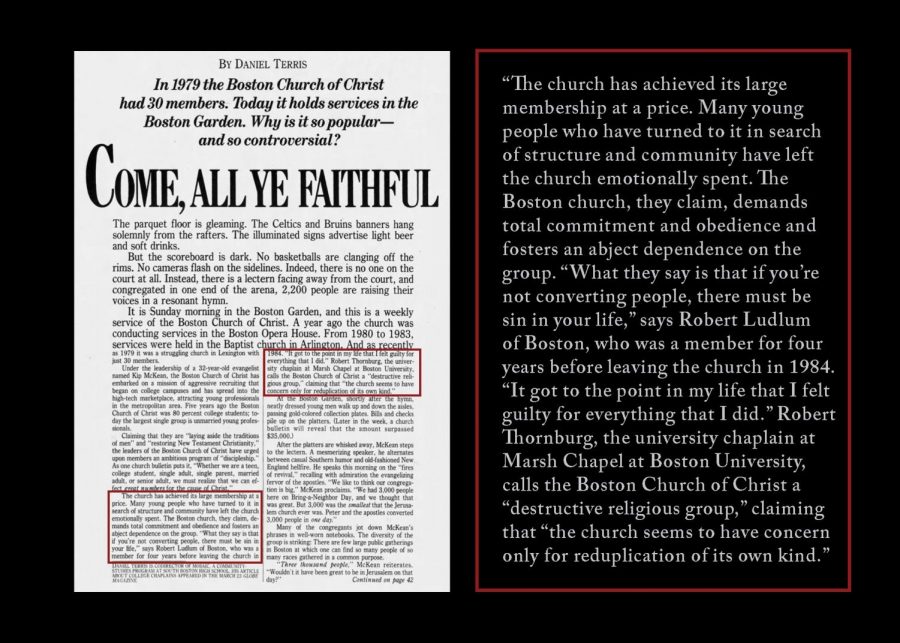
“The church has achieved its large membership at a price. Many young people who have turned to it in search of structure and community have left the church emotionally spent. The Boston church, they claim, demands total commitment and obedience and fosters an abject dependence on the group. “What they say is that if you’re not converting people, there must be sin in your life,” says Robert Ludlum of Boston, who was a member for four years before leaving the church in 1984. “It got to the point in my life that I felt guilty for everything that I did.” Robert Thornburg, the university chaplain at Marsh Chapel at Boston University, calls the Boston Church of Christ a “destructive religious group,” claiming that “the church seems to have concern only for reduplication of its own kind.”
The version of First Principles currently in use by the Boston Church of Christ says “Jesus was thought to be crazy and dangerous even by his own family,” posing the questions “if you are going to follow him what do you think will happen to you?” and “if you are not ever persecuted, what does Jesus say about you? Woe.”
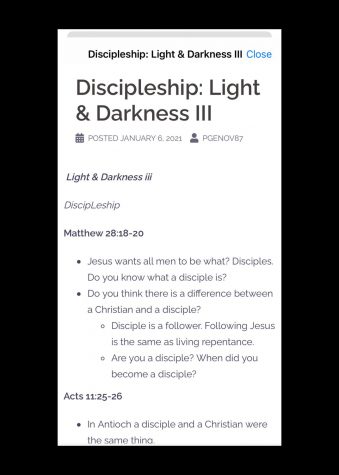
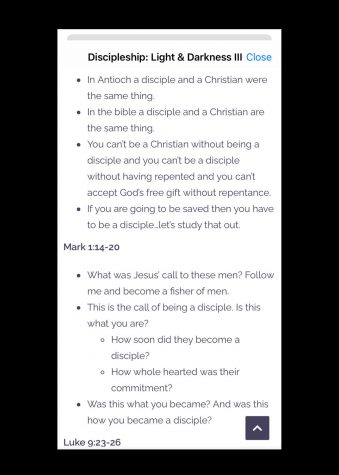
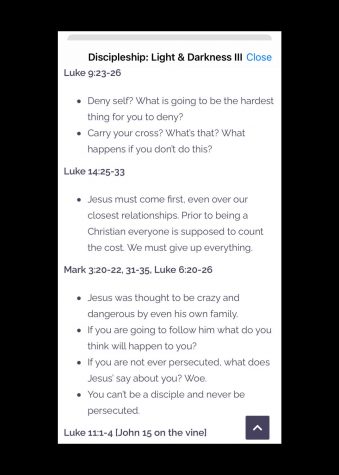
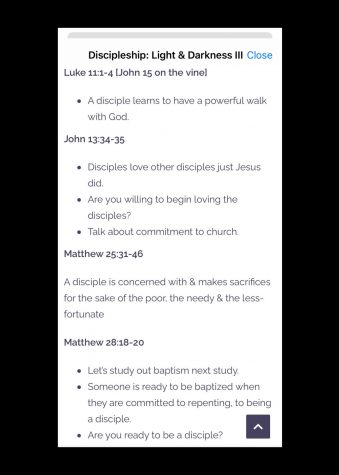
The version of First Principles currently in use by the Boston Church of Christ was retrieved through the free ICOC NE phone app, which can be found in the Apple App Store, as well as the Google Play Store.
There is a less detailed version of First Principles, or the “Bible Study Series” on the website of the Boston Church of Christ as a pdf. document. The document on the website is only accessible with a mobile phone.
In the disclosure of the controversies, Agrella said that her discipler told her ‘you’re gonna find all this old stuff if you even look it up, I don’t want you to be worried about that.’
“I completely fell for it,” said Agrella. “I never once researched it. Never.”
Since the Church’s heyday in the 80s and 90s, education systems were created for students and administrators in order to protect students from destructive faith groups, according to Shelli Jankowski-Smith.
Jankowski-Smith worked closely with Thornburg at the Marsh Chapel and has nearly 25 years of experience working in higher-ed spiritual and religious life in Boston at BU and Northeastern.
By the time of her arrival at Northeastern in 2004 as the Director of Spiritual Life, Jankowski-Smith said that the frequency of reports of the Boston Church of Christ being on campuses had decreased, partially attributing the education systems and creation of policies and guidelines against destructive faith groups.
Although the information about the Church proved to be successful in keeping its campus ministry off-campus and away from students, every few years the Church would pop up on Jankowski-Smith’s radar.
“I think that they got wise to the fact that campuses were really being much more aware of issues and they were just finding new ways to try to weave into the fabric of the campus life,” noted Jankowski-Smith.
The Boston Church of Christ’s campus ministry has been going by the name “Alpha Omega” since as early as August 2015, the time of their first post on Instagram using the name in both the caption and image.
Susan Antonelli, former Simmons University Dean of Students as well as the administrator at a higher-education institution in Eastern Massachusetts, had been unaware of the name until the time of their interviews with the Voice.
The administrator said that the name switch is “indicative” of “shame or secrecy” of the group and their presence on college campuses.
Name changes and use of various “front groups” is one of the ways in which the “Church continues to exist” on college campuses, according to Lee. “They’ll make all these different groups. And it’s kind of hard to figure out what they’re about.”
Lee stated that members are not forthcoming with what church they are associated with until students are well into the proselytizing process.
“It’s like pulling teeth to get any kind of information out of them,” said Lee, noting that oftentimes the information given prior to revealing the church they are associated with is a “nondenominational church group.”
The lack of clarity about what one is getting involved with was mirrored in the stories of former members of the Boston Church of Christ, as well as other International Churches of Christ congregations throughout the country.
The Voice made multiple attempts to contact the Boston Church of Christ about the history of its campus ministry, its existence at Simmons, and how long they have been using the name “Alpha Omega.” Eventually, requests for an interview or comment were declined*.
The position of Director of Spiritual Life at Simmons was eliminated in 2019, however, at the time this story was published, March 18, 2021, Reverend Bonnie-Jean Casey is still listed as the director on the Spiritual Life webpage.
Less than a month and a half before her planned departure from the University after 10 years at Simmons, Antonelli explained that the elimination of the Director of Spiritual Life position was due to budget cuts in recent years.
Administrators “felt like it was most important to have the individuals who are doing the on-the-ground work and advising the student organizations,” according to Antonelli. This approach can be seen in Simmons’ Islamic Society, or Simmons Hillel, where each group has an individual advisor.
There is currently a vacancy for a Christian chaplain, with Antonelli saying “we decided that we were going to wait until we were back on campus to have to do any further searches for any of the faith-based chaplains.”
“Any credible higher-ed college, university, institution, needs to have someone in a director of spiritual life who can troubleshoot this,” said the higher-education administrator about the Church’s presence on college campuses.
Antonelli emphasized she would not automatically deny a student’s request for any faith group to meet on campus, but said “if there’s a group that is known to have predatory practices on college students, I would have to have a really good reason to allow that group on campus.”
During the spring semester of 2020, one of the schools in the Colleges of the Fenway Consortium got a call from a parent who was concerned about the Boston Church of Christ’s presence on one of the campuses, according to Antonelli.
While she could not disclose at which neighboring institution the reported incident occurred, Antonelli says that she and Assistant Dean Corey Zohlman went through all of the room reservations on Simmons’ campuses to see if the Church was meeting.
Antonelli said that she and Zohlman found no evidence, concluding that the group was not meeting on the academic or residential campuses of Simmons.
In addition to Agrella’s reports of the Church’s campus ministry holding weekly meetings in Evans Hall, Simmons students have reported to the Voice that there were weekly meetings taking place in the Evans Hall basement in 2017.
“If they are sort of wiggling their way onto campus, somehow, it’s unknown to me,” said Antonelli, going on to explain that she isn’t able to do anything if it has not been brought to her attention, or if the Church isn’t booking spaces on campus. “I can’t be everywhere at all times.”
“We have a pretty good system of monitoring, whether it’s social media accounts, and then certainly any outside group that comes to campus,” said Antonelli. “That’s something that between OSLA and Student Affairs, we would be keeping a good watch on.”
Despite the system of monitoring that Antonelli spoke of, as well as Simmons holding remote courses amidst the COVID-19 pandemic, Simmons students are still being baptized into the Church.
In tomorrow’s coverage, we hear from a Simmons student who began studying the Bible during the 2020 remote spring semester and was baptized into the Boston Church of Christ over the summer along with the role church elders and church leaders play in retaining members of its campus ministry.

